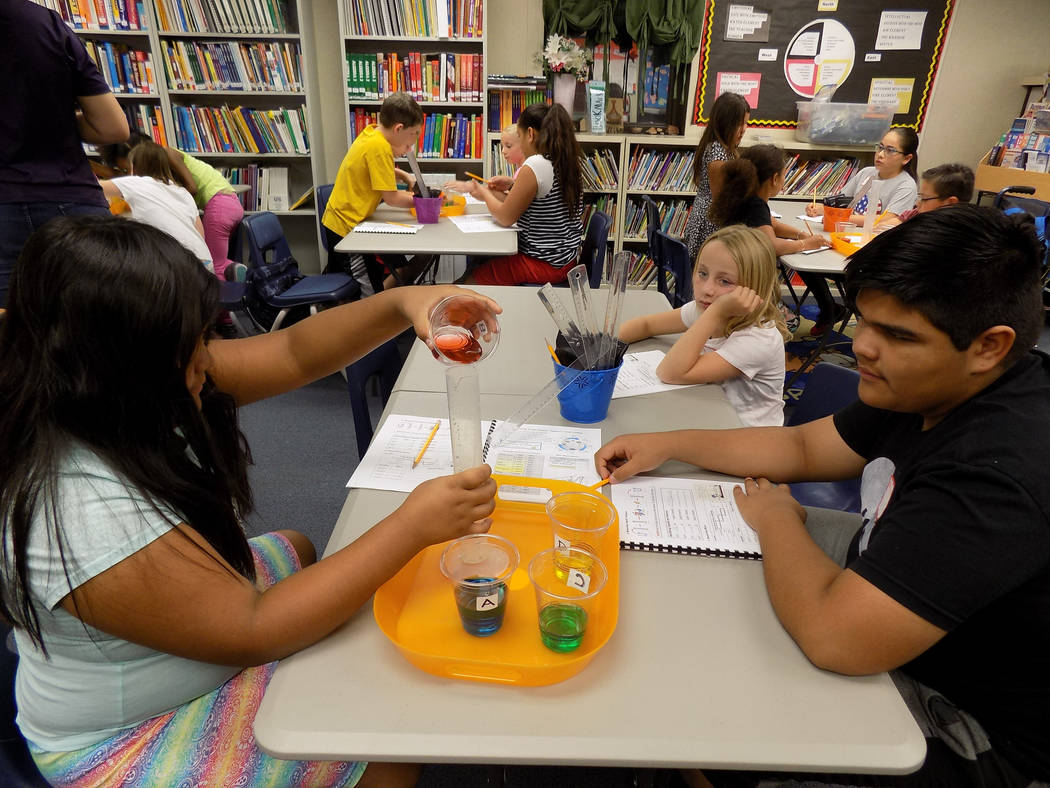$150,000 grant ignored in feud with Clark County schools
Native American students in Clark County are caught in the middle of a feud over the educational support they receive from the school district.
Long-simmering tensions over the level of funding for educating Native American students boiled over recently, when the Clark County Indian Education Parent Committee chose not to apply for a $150,000 federal grant through Title VI of the Civil Rights Act — one of two federal grants totaling nearly $200,000 it has regularly received in recent years.
The decision to forgo the funding, designed to ensure equal educational opportunities, is an attempt to demonstrate that the Clark County School District is overreliant on federal grants when it comes to providing resources for Native American education, said Petra Wilson, the committee chairwoman.
“The school district thinks that those two grants should be pretty much the base of funding for Indian ed. They’ve never really offered anything else,” she said. “Everyone else is complaining about the budget cuts. We’re complaining there’s never been a budget.”
Between 1,300 and 1,400 of the district’s 320,000 students are Native American or Alaska Natives. That’s less than half a percent of the district’s overall population. But federal protections are in place to guarantee them a certain level of support, since they tend to graduate at lower rates than their classmates of other ethnicities.
Ongoing issue
The district owns and operates the Moapa Educational Support Center, a resource and counseling center on the Moapa River Indian Reservation. It is open to all district students but serves Native American children primarily.
It also staffs and runs an Indian Education Opportunities program in the town of Moapa.
Including employees, benefits, supplies and technology, the district expects to spend $187,868 on the programs this year, school district spokeswoman Melinda Malone said. That doesn’t include the cost of utilities and a district vehicle, she said.
But tribal members and the parent committee think the district needs to do more.
“This was not a rash decision. This is several years of dealing with the same thing over and over,” Wilson said of the decision to forgo the grant. “It was bold, but it needed to be done.”
Wilson, 50, has been involved with the committee for almost 10 years and said it’s been a constant battle with the district.
“Our tribes are sovereign nations, and they don’t treat them with the respect of a sovereign nation,” she said.
District officials said they were disappointed the parent committee chose not to apply for the grant. But district-funded student success advocates (SSAs) are still meeting with Native American students in their schools and trying to help guide them to resources, the officials say.
“I have the SSAs meeting with students at their home schools, connecting them to the resources and academic support that is available in their individual schools,” said Tammy Malich, the district’s assistant superintendent for the education services division. “Sometimes, for our native students, they’re not quick to call attention to themselves or go ask questions, so it’s kind of taking them by their hand to say, ‘Here’s your counselor.’”
When the grants were functional, Malich said, the advocates would also let students know about academic resources or cultural events the grants were funding.
Support center
The Moapa Educational Support Center, run by Clark County employee Della Frank, shows the impact of the infighting. Some of the grant money was used to provide programming, counselors and tutors at the center.
Without the grants, the center is a lot quieter this year, said Frank, who raised the issue with the Clark County School Board in early September.
“The fact is the MESC has been ignored, and the Title VI grant funding being pulled away exposed that tremendously,” Frank said. “I’ve had to beg and plead for everything.”
Frank said that, unlike the Academic Support Center in Las Vegas, she doesn’t have her own budget, limiting her ability to meet student needs.
But Malich said the Moapa center is set up to function as more of a community center that also serves academic needs.
“I think there’s an added advantage to be able to receive parents during the day while kids are in school to answer questions or provide assistance. There’s a computer lab,” she said.
Neither the Moapa Educational Support Center nor the Indian Education Opportunities program is facing funding cuts, but Malich said that could change if she is forced to reduce expenses from her department in a new round of budget cuts.
She said it was unfortunate the parent committee chose not to apply for the grant, especially when the district is having financial issues.
“The loss of dollars at these times impacts students, and it makes my heart heavy to think students are going to be impacted above and beyond what is already going on,” she said.
Contact Meghin Delaney at 702-383-0281 or mdelaney@reviewjournal.com. Follow @MeghinDelaney on Twitter.
Grant funding
The parent committee group previously applied for two grants, a Title VI grant and a Johnson O'Malley grant. Both grants are meant to serve Native American students. The parent committee used to use the Title VI grant to provide mostly academic resources and the Johnson O'Malley grant primarily provided a cultural component.


































